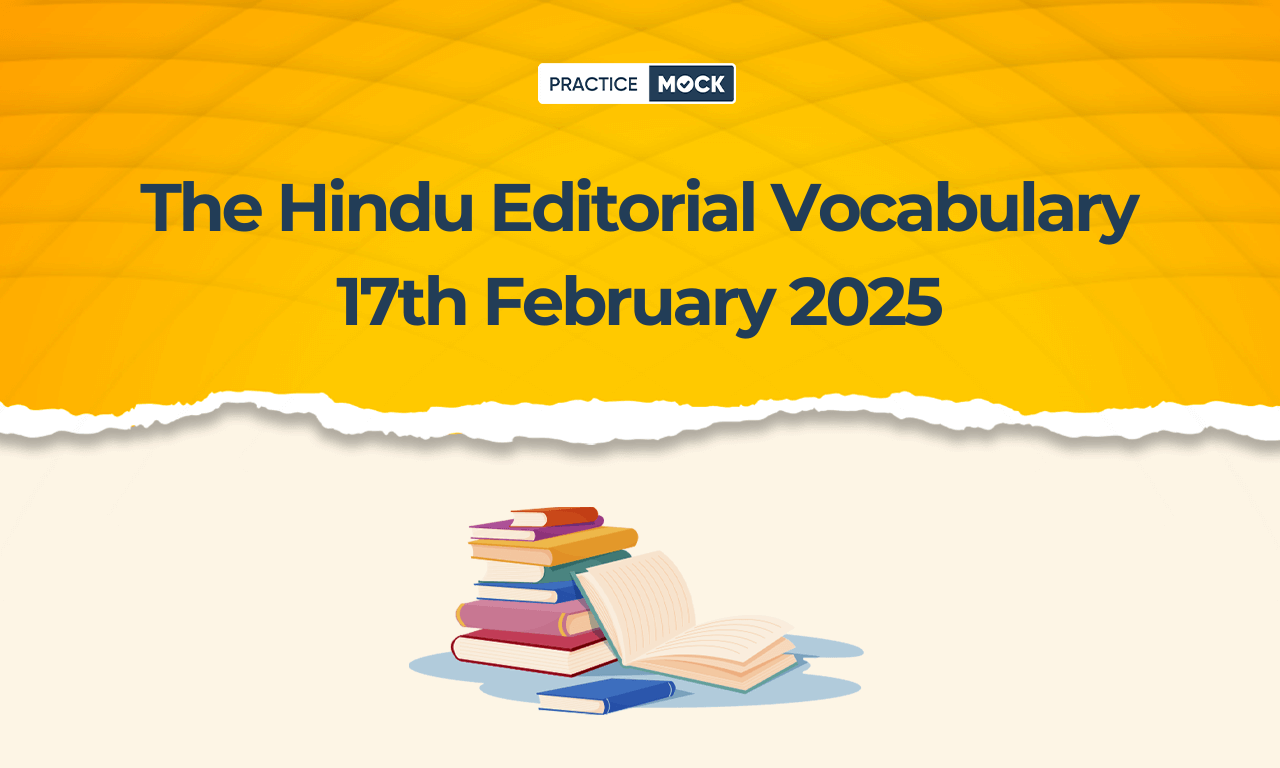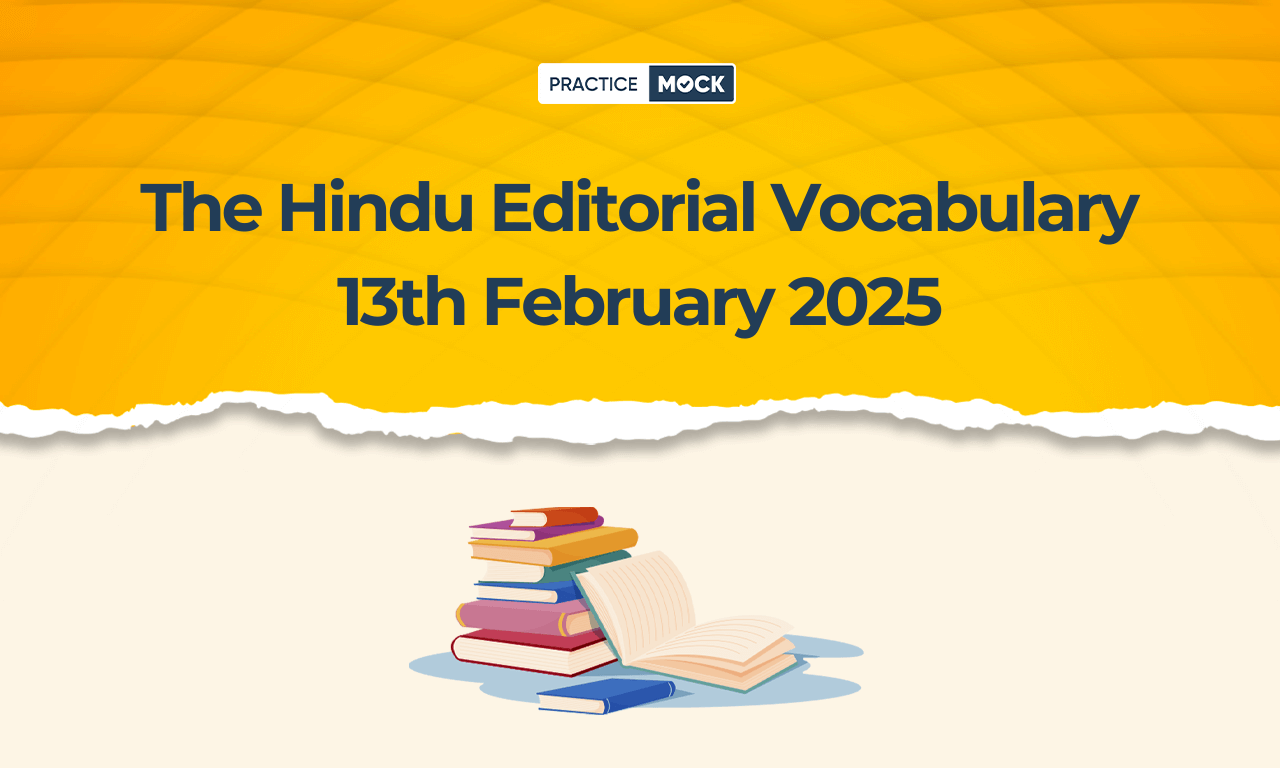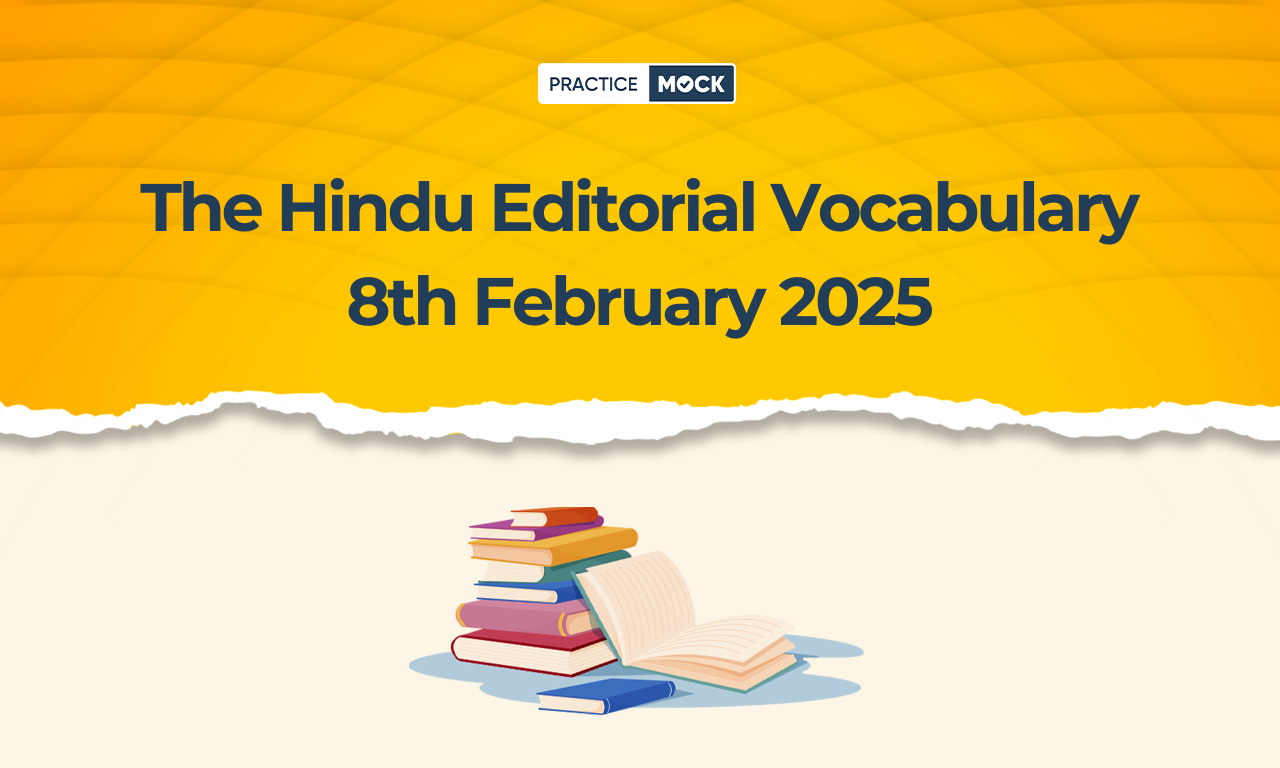The Hindu Editorial Vocabulary– January 23, 2024; Day 537


| Difficult Word/ Phrase | Contextual Sense |
| Rituals | A fixed set of actions and words, especially as part of a religious ceremony |
| Proponents | A person who speaks publicly in support of a particular idea or plan of action |
| Divergent | Different or becoming different from something else |
| Nationhood | The fact of being a nation (= a country with its own government, language, traditions, etc.) |
| Inauguration | The act of officially putting someone into an important position, or the ceremony at which this is done |
| Definitive | Considered to be the best of its type |
| Milestone | An important event in the development or history of something or in someone’s life |
| Comprehensive | Complete and including everything that is necessary |
| Humility | The quality of not being proud because you are aware of your bad qualities |
| Invoked | To request help from someone, especially a god, when you want to improve a situation |
| Universality | The quality or state of being universal (= existing everywhere, or involving everyone) |
| Encompasses | To include different types of things |
| Inheritance | Money or objects that someone gives you when they die |
| Exhorted | To strongly encourage or try to persuade someone to do something |
| Purposefully | In a way that shows that you know what you want to do |
| Conception | An idea of what something or someone is like, or a basic understanding of a situation or a principle |
| Facilitated | To make something possible or easier |
| Verdict | An opinion or decision made after judging the facts that are given, especially one made at the end of a trial |
| Disputed | Used to describe something that is the subject of disagreement, especially official or legal disagreement |
| Petitioners | A person who organizes or signs a petition |
| Unambiguously | In a way that makes completely clear what is meant |
| Demolition | The act of destroying something such as a building |
| Unmindful | Not remembering, noticing, or being careful about something |
| Reconciliation | The process of making two opposite beliefs, ideas, or situations agree |
| Abandoned | Left in a particular place or condition, usually forever |
| Unpredictable | Likely to change suddenly and without reason and therefore not able to be predicted (= expected before it happens) or depended on |
| Malleable | Easily influenced, trained, or controlled |
| Forging | To make an illegal copy of something in order to deceive |
| Accentuating | To emphasize a particular feature of something or to make something more noticeable |
| Wisdom | The ability to use your knowledge and experience to make good decisions and judgments |
| Statecraft | The skill of governing a country |
From fear to hope: On Ram temple consecration
The Ram temple must help in healing wounds and creating harmony
The opening of the Ram temple in Ayodhya is a sharp turn in the course of the nation. The central role of the state in the rituals (a fixed set of actions and words, especially as part of a religious ceremony) associated with the inauguration of the temple is being celebrated by the proponents (a person who speaks publicly in support of a particular idea or plan of action) of the temple, while its opponents fear it is the beginning of a dangerous slide. Two divergent (different or becoming different from something else) visions of Indian nationhood (the fact of being a nation (= a country with its own government, language, traditions, etc.) inspire the two sides. The inauguration (the act of officially putting someone into an important position, or the ceremony at which this is done) of the temple marks a definitive (considered to be the best of its type) milestone (an important event in the development or history of something or in someone’s life), if not a comprehensive (complete and including everything that is necessary) victory, for the vision of the BJP and Prime Minister Narendra Modi. Mr. Modi said it was the beginning of a new era in the history of the country, an era that will last for centuries. He called for humility (the quality of not being proud because you are aware of your bad qualities) alongside the celebration of victory and invoked (to request help from someone, especially a god, when you want to improve a situation) the universality (the quality or state of being universal (= existing everywhere, or involving everyone) of the spirit of Ram that encompasses (to include different types of things) all of humanity. Portraying the temple as a link between India’s rich cultural inheritance (money or objects that someone gives you when they die) and ambitions for the future, across the various regions and communities of the country, Mr. Modi exhorted (to strongly encourage or try to persuade someone to do something) fellow citizens to think big and work purposefully (in a way that shows that you know what you want to do) for progress. Ram Rajya has had multiple imaginings. The temple in Ayodhya must inspire and promote the conception (an idea of what something or someone is like, or a basic understanding of a situation or a principle) of a polity determined not by an obsession with the past, but by an appreciation of the difficulties of the present, and the challenges and opportunities of the future.
The Prime Minister also noted the fact that the temple was facilitated (to make something possible or easier) by a judicial decision. The Supreme Court verdict (an opinion or decision made after judging the facts that are given, especially one made at the end of a trial) that handed over the disputed (used to describe something that is the subject of disagreement, especially official or legal disagreement) land in Ayodhya to the Hindu petitioners (a person who organizes or signs a petition) had also unambiguously (in a way that makes completely clear what is meant) noted that the demolition (the act of destroying something such as a building) of Babri Masjid on December 6, 1992, by kar sevaks was a “serious violation of law”. Devotees of the temple, in their moment of celebration, should not be unmindful (not remembering, noticing, or being careful about something) of the past. Triumphalism and grievance must give way to reconciliation (the process of making two opposite beliefs, ideas, or situations agree) and harmony; and fear must yield to hope. The temptation to use the same template of settling contests over places of worship must be abandoned (left in a particular place or condition, usually forever) immediately. Seeking to settle historical grievances can trigger unpredictable (likely to change suddenly and without reason and therefore not able to be predicted (= expected before it happens) or depended on) social forces and risk national unity. Mr. Modi himself noted this fact while appreciating the relative ease with which the temple was built after the Supreme Court verdict in 2019. In the making of present-day politics, the past is often used as malleable (easily influenced, trained, or controlled) material. It can surely be deployed for the purpose of forging (to make an illegal copy of something in order to deceive) unity and creating harmony, instead of for accentuating (to emphasize a particular feature of something or to make something more noticeable) differences. The wisdom (the ability to use your knowledge and experience to make good decisions and judgments) of statecraft (the skill of governing a country) is in making the right choice.
Unlock the power of words, one step further! Download the Lists of Word-Meanings of Previous Months here.
Recent Posts
Data Interpretation Important Question For SBI Clerk Mains 2025 Exam
In this article we are providing the Data Interpretation Important Question For the SBI Clerk…
AIC Management Trainee Syllabus 2025, Check Exam Pattern
Prepare for the AIC Management Trainee Exam 2025 with a clear understanding of the syllabus…
RRB JE CBT 2 Exam Date 2025 Out, Exam on 22 April
The RRB has released the RRB JE CBT 2 Exam Date 2025. Read this blog…
Banking Current Affairs PDF, Bazooka Download for Free
in this article we are providing the Bazooka Monthly Current Affairs PDF, Download Free PDFs.…
IBPS Application Reprint Link Activated for PO, Clerk and SO for Joining
The IBPS has released online application link for Clerk, PO and SO posts. Candidates can…
Weekly Current Affairs PDF 2025, Free Download For Banking, SSC Exams
Here we have provided Weekly Current Affairs 2024 PDF. Candidates can download Free Weekly Currents…


